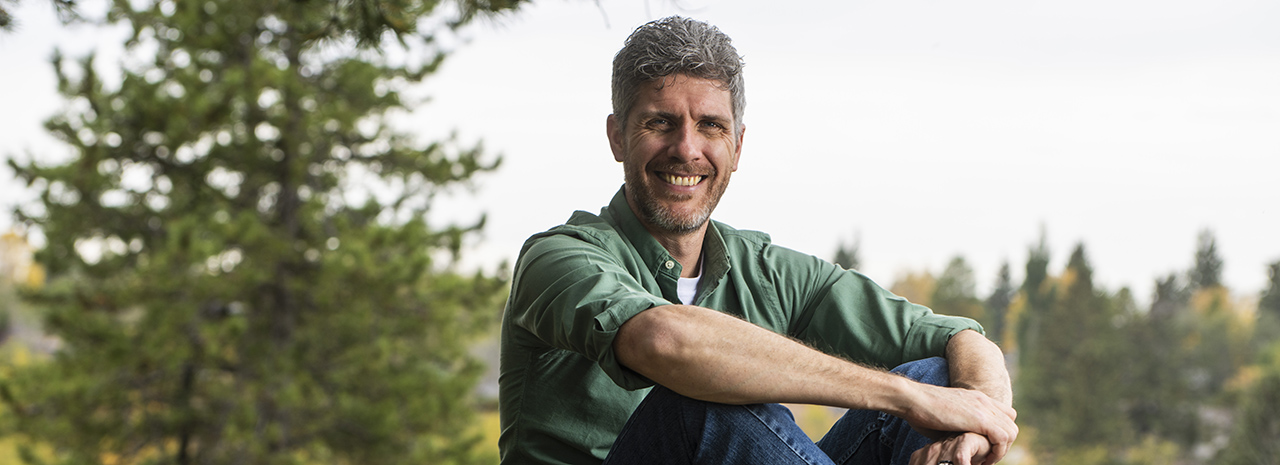A Message of Movement
Mifi Purvis - 13 June 2024

A long-distance runner, Gianluca Vernillo came to Augustana Campus from the University of Milan. He’s an assistant professor of physical education, and his research focuses on neuromuscular fatigue, high-level sport performance and endurance and what they reveal about the capacity of exercise to affect health in various populations. We caught up with him one afternoon after class.
When did you come to Augustana?
My appointment started in July 2023. I was in Alberta prior to that, with a postdoctoral research assistant position, then I moved back to Italy until I got this position.
Your research focus is on physiology, high-level sport performance and endurance. What does this kind of expertise bring to your students?
I think that the background I have, both in terms of exercise physiology and sport performance, can give our students here at Augustana Campus an immediate contextualization of the theoretical knowledge that they acquire during the different lectures. I worked with elite Kenyan marathon runners and also with the Italian snowboarding team in preparation for the Olympic Games. So my experience is not all about theory, and it is not all about practice. It’s about the ability to bridge these two to provide immediate contextualization. When we learn, we discuss in classes from a theoretical perspective. We try to contextualize it into more practical examples that are based on experiences. I think that it could be an asset for our students to better contextualize learning, and do it more immediately.
On your roster of courses, there’s one called Exercise in Special Populations. What’s that about, and why is it important?
By special populations, we refer broadly to people suffering from certain diseases, certain pathologies or conditions of aging. So let’s say they present with disease, pathology or some physiological processes related to aging — these can be considered special populations. And teaching and studying exercise in these populations is important if you consider the context: that exercise is a kind of medicine. Basically, from a theoretical perspective and from a practical perspective, we want to support a healthy, active lifestyle for all people. There is a huge amount of scientific evidence showing that physical activity and exercise are able to reduce the risk, the prevalence and the severity of different chronic diseases to decrease the risk of mortality from cardiovascular and other causes. So, we want to reduce the prevalence and the worsening of chronic diseases.
What do you take from your expertise in high-level sport to apply to special populations?
One of my supervisors and mentors during my PhD gave me an example. We have to consider that sport performance is a sort of a gold standard for how the human body works at its best. And by knowing the physiological adaptations that type of body goes through thanks to training, we can also target the same type of training, tailored to the special populations, to get the same adaptations. It’s a matter of designing the right intervention for the person in front of you.
Can you talk about some of the research you’re undertaking or that you plan to do while you’re at Augustana?
An aspect of my research that I would like to continue to develop here at Augustana is related to fatigue. Fatigue is one of the most common and distressing symptoms experienced by athletes. We have healthy individuals and also clinical populations, and I’m particularly interested in studying the effect of neuromuscular fatigue and also fatigue during human performance in these populations.
And what attracted you to that area of research?
I’m a runner, and I started to develop more interests to understand the limits of our capacity when we push our body towards extensive, prolonged exercise, like running ultra marathons. I was interested in the study of the physiological and biomechanical adaptations of the human body when we performed these exercises, and really interested in the concept of neuromuscular fatigue, in particular.
Do you anticipate involving any of your students in undergraduate research?
Yes, their training is of paramount importance. This is a goal for the medium term. The plan is to involve the students in undergraduate research or even potentially to hire undergrad students. This sort of training is important for them, I believe.
What kind of things are you reading or listening to?
I must say that I’m not a podcast type of guy, but I’m addicted to rock and roll music. Doesn’t really matter the type of rock and roll or the band as long as it is rock and roll. And I’m reading the novel Don Quixote by Miguel de Cervantes. I always wanted to read it and I finally decided to start. So that’s basically my focus now outside science: reading and chilling out by listening to music — as well as running.
What do you wish everyone knew about exercise and fitness, whether for rehab or for performance?
I already spoiled the answer! I wish everyone understood that, if we are able to move, we can exercise and exercise is medicine. One of our duties as faculty is to develop the next generation and make them more responsible, more aware and potentially open their mind to different ideas — and this is an important one.